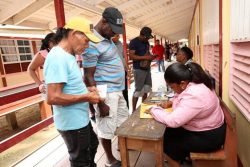By NAN Business Editor
News Americas, NEW YORK, NY, Fri. March 4, 2022: Exclusion from global finance through the withdrawal of CBRs (Corresponding Banking Relationships), has worrisome implications for the Caribbean as does the effects of de-risking.
That’s according to a new report, ‘Financial De-Risking In The Caribbean: The US Implications And What Needs To Be Done,’ by the Atlantic Council Adrienne Arsht Latin America Center. De-risking refers to the phenomenon of financial institutions terminating or restricting business relationships with clients or categories of clients to avoid, rather than manage, risk.
The report noted that “loss of CBRs limits the ability for governments and hotels in a region, heavily dependent on tourism and access to hard currencies and the use of credit cards, to process transactions from visitors.
CBRs are also integral to remittance flows to the Caribbean, the report noted and rising costs of transactions, due to costly regulatory requirements and fines, have put remittances to working-class populations in the region at risk, potentially inducing loss of livelihoods.
The other impact is on limited access to trade finance stunts development and economic growth for a region already struggling to recover during the pandemic.
The report’s authors, Jason Marczak and Wazim Mowla, note that the effects of de-risking in the Caribbean have implications beyond its borders.
“Due to the many existing interlinkages with the Caribbean, the United States and the broader hemisphere are also impacted. Many products and services imported to the Caribbean come from the United States, Europe, and some Latin American countries. Loss of remittances and limited access to trade finance would decreases the purchasing power of Caribbean businesses and their ability to import goods,” the report stated. “Amid the loss of CBRs and the critical functions they facilitate, conditions conducive to instability and shadow banking rise. Instability can be a push factor for migration across the hemisphere, including to US borders, and shadow banking can fuel illicit activities for transnational criminal organizations.”
The report recommends the United States helps the Caribbean address de-risking, given how it affects US strategic interests.
As the authors note: “Limited purchasing power as a result of the indirect effects of de-risking affects US suppliers of goods and services to the Caribbean (while) loss of US CBRs and the dollar opens a space for Caribbean government and banks to further engage with Chinese currencies and financial institutions.”
Further, “the job loss and poverty induced from the withdrawal of CBRs can increase crime and membership in organized crime throughout the hemisphere.”
It urged the US to work with international partners, financial institutions, and regional governments, “to lead a new effort to protect Caribbean livelihoods against further de-risking by creating a transparent set of compliance standards, the tools to reach them, and new banking relationships.”
“Doing so can create a hopeful Caribbean future and strengthen the region’s relationship with the United States,” the authors stated.







